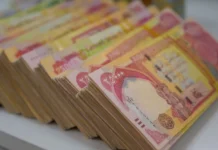Financial and banking expert Mustafa Hantoush says Iraq’s public debt is still within safe limits, mainly because most of it is internal and held by government institutions — making it far less risky than foreign debt.
Speaking to dinaropinions.com, Hantoush explained that Iraq’s domestic debt is close to $71 billion, and most of it is owed to entities like the Central Bank, state-owned banks, and government funds and companies. Because these are internal obligations, they put much less pressure on the state treasury. A smaller portion is tied to citizen bonds and the pension fund, which he says requires more careful planning when it comes to repayment.
When it comes to external debt, Hantoush says Iraq owes very little compared to many other countries. He broke it down as follows:
- $3 billion remaining from Paris Club debt
- $10 billion still due under ongoing commitments
- $40.5 billion owed to Gulf states from the Iran–Iraq War — debt he described as “almost worthless” and unlikely to ever be repaid
Hantoush stressed that the real issue isn’t the current debt level. The real risk comes from future borrowing if it’s not used wisely. He warned that any new debt must go toward private-sector investment and real economic development, not routine government spending or operating costs.





